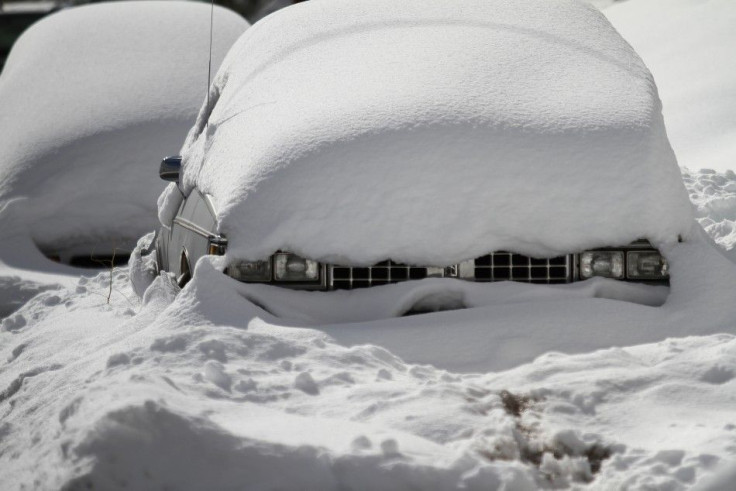Stranded Man Survives 10 Days On Melted Snow And Other Tales Of Survival

James Klemovich, a 76-year-old diabetic from Colorado, survived 10 days in snow after his car became stuck in the remote Nevada desert. Klemovich survived by melting and drinking snow until his rescue Tuesday; a friend who was with him died after leaving to get help.
The two failed to dislodge the stuck car; they lit fires to draw attention; however, the area where they became stuck, Pershing County, Nevada, isn't densely populated. In fact, there are only about 7,000 people spread out across 6,000 square miles, according to the Associated Press.
Klemovich used a towel to strain water and snow into bottles and kept a journal of how much he drank and what he did. He was finally discovered by military personnel who were conducting a training exercise in the area.
His friend, Laszlo Szabo, 75, was found dead a mile and a half away.
Klemovich is the second person in as many weeks to survive being trapped in his car. David Heatherly got stuck on a snowy Montana mountain road in an SUV, leaving him trapped for three days. He attributed his survival to God, beef jerky and the video game Angry Birds.
Heatherly rationed the little bit of food and water he had and set up a regimented routine. He napped 45 minutes out of every hour, and for the 15 minutes he was awake, turned on the car's heater, ate a small piece of jerky and played Angry Birds to keep his wits. The isolation began to get the better of him, however.
At one point, late Sunday night or Monday night, I wrote out a will just in case, Heatherly told the AP. Those moments passed. Not quickly, but they passed.
Once the weather cleared, Heatherly left his car and walked several miles until he found someone.
In December, Lauren Elizabeth Weinberg, 23, survived in her car for nine days after she became trapped in two feet of snow. She survived on two candy bars and melted snow until she was found.
I am so thankful to be alive and warm, she said in a statement. Thank you everyone for your thoughts and prayers, because they worked. There were times I was afraid but mostly I had faith I would be found.
In May, Rita Chretien, 56, was rescued after surviving for 49 days on melted snow and trail mix after her van was trapped in the Nevada wilderness.
She did a lot of things right -- enough things right -- she stayed with the vehicle, she stayed hydrated, rationing whatever food she did have and she didn't panic, Brian Wheeler, president and founder of the Northwest School of Survival, a company that teaches survival skills, told the Oregonian. You can live without food for weeks, it's not fun but you can. But you can't live without water. Three or four days is about max, so that's very important.
Perhaps one of the most harrowing tales of survival was in February, when Peter Skyllberg was rescued after being trapped in his car for two months with no food. Even though the temperature around him dropped to -15 degrees Fahrenheit (-26 degrees Celsius), Skyllberg was able to survive because the snow around his car insulated him like an igloo and kept the car at 0 degrees Fahrenheit (-17 Celsius).
Skyllberg, 45, had no food for the eight weeks he was trapped; he survived by eating handfuls of snow and going into a dormant like state, Stefan Branth, a researcher at the University of Uppsala, told Swedish newspaper Vasterbottens-Kuriren.
A bit like a bear that hibernates. Humans can do that, he said, according to Reuters. He probably had a body temperature of around 31 degrees [Celsius] (88 degrees Fahrenheit), which the body adjusted to. Due to the low temperature, not much energy was used up.
In case of road emergencies, AAA recommends stocking your car with a winter emergency kit containing flashlights, flares, a first aid kit, nonperishable food, blankets, extra batteries and tire chains before heading out into the snow.
If you do become trapped, it's important to stay in your car unless help is very close, Brian Brawdy, an outdoor survival expert, told ABC News.
One, it'll help block the wind and keep you warm and dry, he said. And two, if someone does come to look for you it'll be easier for them to find your car than it would be you as an individual stuck in a snow bank.
If you are trapped in a remote area though, it's unlikely someone will find you, Wheeler at the Northwest School of Survival said. He recommends telling friends and family where you're going and which roads you'll take, staying off dangerous roads and carrying two or three days' worth of food and water.
© Copyright IBTimes 2024. All rights reserved.





















